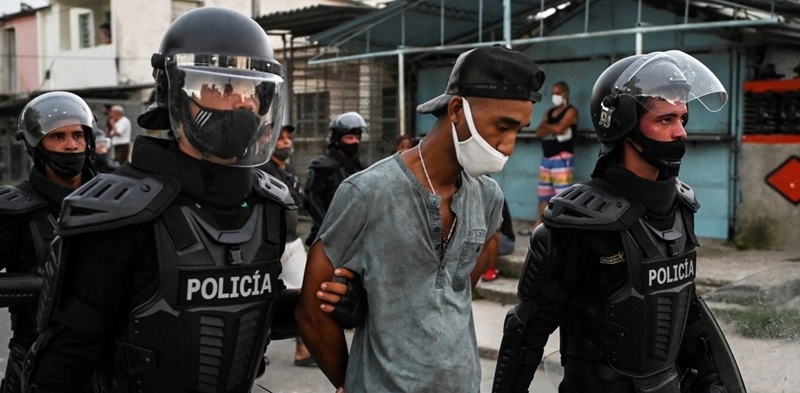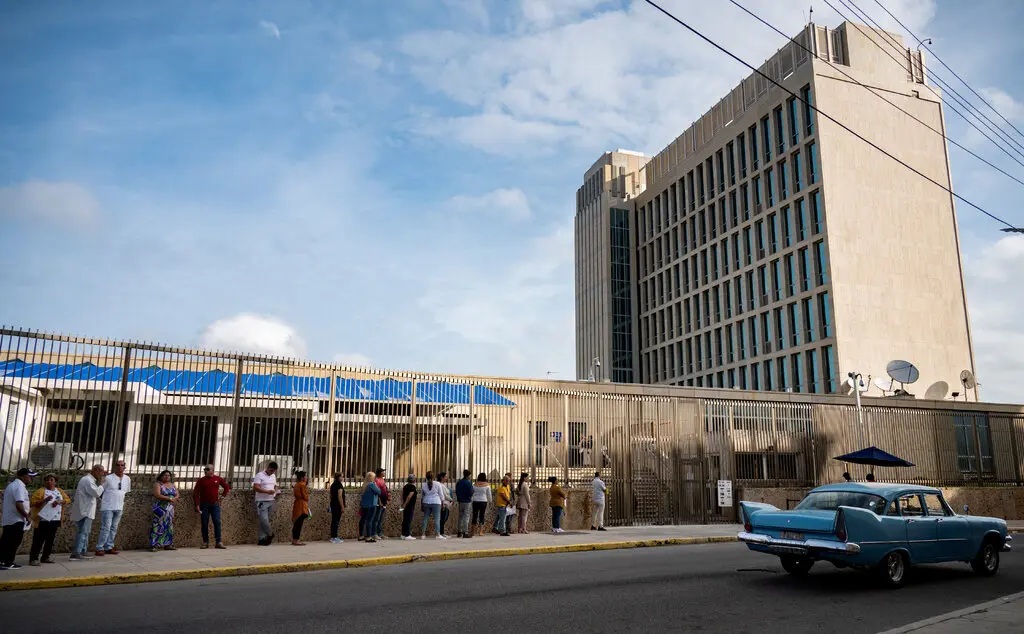The Cuban regime threatened to re-arrest political prisoners who had been released early if they fail to meet the "requirements." Humberto López is once again at the center of another chapter of terror directed at civil society.
pic

The Cuban regime issued new warnings to the recently released political prisoners under the benefit of early release, stating that they could be detained again if they do not meet the imposed requirements.
These statements were made on Friday during the state-run television program "Hacemos Cuba", which in its latest episode addressed the "National Exercise for Prevention and Confrontation of Crime and Social Indiscipline."
During the program, Colonel Danisét González Sánchez, head of the Information and Analysis Department of the General Directorate of the Revolutionary National Police (PNR), confirmed that meetings were held with individuals on parole, which even included high-ranking government officials.
“In the case of the meetings with criminal elements, individuals who are already under police surveillance were drawn in. Moreover, individuals who are currently enjoying the benefit of early release were also brought to these meetings,” explained González Sánchez.
The presenter of the program, Humberto López, took the opportunity to ask what had happened to some of the attendees of those meetings, who had not returned home.
"You tell me if I am right or not. I was told that in some places they called some who went to the meeting and didn't return home. Is that true, is it correct? Can they do that, is it legal? Why? What is the purpose of this action?" López asked with malicious eagerness.
The coronel responded: “Regarding those who were detained, I can tell you that there were sufficient elements indicating that they had violated the requirements under which they were granted benefits for those behaviors.”
"In the exercise, the intention was aimed, as part of the prevention activity, to exert greater influence and control over individuals displaying maladaptive behavior in the community, but also over those prone to committing crimes," added the PNR officer.
Veiled threats and police surveillance
According to González Sánchez, the regime maintains strict surveillance over individuals released under the benefit of early release, as well as those considered likely to commit crimes.
"People who are already under police surveillance were drawn to these meetings," González stated, justifying the arrests by arguing that "there had been a whole prior stepped-up effort involving the police, the family, community factors, and prevention groups."
This intimidation strategy is part of a broader tactic by the Cuban government to control the opposition and civil society.
Cuban authorities have intensified their rhetoric and actions as part of the anti-corruption campaign promoted by Miguel Díaz-Canel, which has resulted in the detection of tax violations amounting to 72 million pesos, the , and the closure of hundreds of private businesses across the island.
In recent weeks, the regime has intensified its repressive actions, with more than 3,300 arrests and summary trials, according to recent reports.
The exercise of prevention has also been used as a tool to discredit activists and opponents. Through state television, the regime has attempted to associate dissent with criminal activities and has intensified its rhetoric against those who denounce the situation in the country.
In the broadcast of "Hacemos Cuba," it was emphasized that control operations will remain active and that conditionally released individuals can be detained again if they do not comply with the strict conditions imposed.
"These individuals who had not managed to change their behavior were arrested and charged with the crime of disobedience," stated the representative from MININT invited to López's program, a government-supporting host known for defaming and discrediting activists, as well as intimidating independent civil society.
The airing of the ill-fated program last Friday reflects the regime's growing concern about social discontent and its intention to maintain strict control over opponents and the general public.
Although the "National Exercise for Prevention and Counteraction Against Crime and Social Indiscipline" took place in early December 2024, it was not until Friday that the Cuban regime devoted television airtime to it, intentionally highlighting the threat of a return to prison for those political prisoners granted early release, who began to be released in mid-January 2025.
The threat of new arrests for those released on early parole confirms the government’s strategy of repression and intimidation as mechanisms of social control.
Despite official efforts to project an image of order and legality, independent reports and civil society complaints continue to expose the reality of a country marked by political persecution and a lack of legal protections for its citizens.
The decision is the latest in a series of conflicting U.S. approaches to Cuba by different administrations.
By Zolan Kanno-Youngs and Frances Robles / The New York Times

President Biden will remove Cuba from a list of state sponsors of terrorism, U.S. officials announced on Tuesday, as a part of a deal that is expected to free protesters jailed during a sweeping 2021 crackdown by the Communist government.
The decision by Mr. Biden is the latest in a number of environmental, immigration and foreign policy decisions taken in the final days of his presidency before President-elect Donald J. Trump returns to the White House. Removing Cuba would typically raise expectations of normalized relations between Washington and Havana.
But Mr. Biden’s decision is only the latest in a series of conflicting U.S. approaches to Cuba by different administrations. The Obama administration made the decision to remove Cuba from the list. But days before Mr. Trump left office in 2021, his administration placed Cuba back on it.
Mr. Biden’s move could help Cuba’s battered economy. Major banks had stopped doing business with Cuba because it was too much trouble to make sure that the country satisfied all the requirements to legally do business there.
It is unclear if Trump will reverse Mr. Biden’s decision.
The U.S. officials, speaking on the condition of anonymity to preview Mr. Biden’s action, said the United States was removing Cuba from the list as part of an effort, pushed by the Catholic Church, to free jailed protesters.
They were detained after the government imposed a brutal crackdown following one of the largest demonstrations in Cuba since the Communist government took power roughly six decades ago by protesters angry over the nation’s spiraling economic decline.
Human rights groups say some of those arrested during and after the protests have been tortured and that many have been sentenced to long prison terms after unfair trials.
Many experts have long criticized Cuba’s inclusion on the list of state sponsors of terrorism.
“The statute that creates the terrorism list specifies giving material support to terrorists or harboring terrorists who are actively engaged in terrorism while you are harboring them,” said William LeoGrande, a Cuba expert at American University. “Cuba just hasn’t done those things.”
Several U.S. fugitives do reside in Cuba, but they should not count because they were Americans, were involved in politically motivated violence in the United States, and were not international terrorists, Mr. Leogrande said.
DW Documentary is a German public broadcast service
In Cuba, the socialist project begun by revolutionary and former president Fidel Castro is teetering on the verge of failure. The nation is sinking deeper into crisis, with many people’s daily lives marred by shortages of food, medicine and electricity.
Cuba has been subject to sanctions for decades. Despite recent attempts at reform, the country is increasingly isolated and economically dependent. A currency reform enacted in 2021 is also causing major problems, with inflation soaring and prices skyrocketing. Food is scarce, and lines in front of the few state-run stores are getting longer and longer.
Poverty is on the rise. Even the famous ingenuity of the Cuban people is reaching its limits as they try to cope with the day-to-day effects of the crisis. Images of bygone revolutionaries are fading in the streets the capital, Havana, and all over the island. Official voices continue to broadcast the state’s ideology, but ordinary people are losing hope that things will improve.

HAVANA (AP) — Non-governmental organizations monitoring Cuban prisons demanded an investigation Tuesday into the death of a man imprisoned since 2021 after being arrested for participating in historic protests against shortages and blackouts.
Authorities say 29-year-old Manuel de Jesús Guillén Esplugas committed suicide in prison. However, relatives claim he succumbed to injuries sustained during a failed escape attempt at Combinado del Este prison in Havana, where he was serving a six-year sentence.
Guillén, a member of an opposition group called the Patriotic Union of Cuba, died on Saturday and his remains were returned to his family over the weekend.
“What we were able to find out, through various sources, is that Manuel was trying to escape from prison, and was caught in the act,” said Camila Rodríguez, representative of Justicia 11J, an NGO that keeps track of the situation of detainees in Cuba. “We will never know for sure what happened, unless they let us enter the prison and interview and reconstruct the events independently,” she added.
USA Department of State CUBA 2023 HUMAN RIGHTS REPORT (266.6KB)
Cubans have been grappling with several crises in rapid succession in the past three weeks after the island’s eastern region was hit Sunday with a powerful earthquake even as the country was still reeling from two hurricanes that brought death and devastation.
A 6.8 magnitude earthquake in the ocean 20 miles off Pilón, a town on the southern coast of the province of Granma in eastern Cuba, shook the region on Sunday minutes before noon, leaving no casualties but at least two children, among them a five-year-old, and two adults injured, Cuban state media said.
The strong tremor followed a magnitude 5.9 earthquake earlier on Sunday morning that the United States Geological Survey said occurred 21 miles south of the nearby municipality of Bartolomé Maso, also in Granma province.
Cuba’s National Center for Seismological Research reported Monday morning that it had detected 885 tremors – including the two biggest ones - in the area in the past 24 hours. Eastern Cuba is in an active seismic zone in the Caribbean that is responsible for most of the tremors felt on the island. In 2020, the Center reported a 7.7 magnitude earthquake west southwest of Cabo Cruz, in Granma province, but it happened at sea and did not cause damage.
The country’s leader, Miguel Díaz-Canel, urged residents in Granma to remain in open areas and follow earthquake protocols. Videos circulating on social media show panicked residents in Pilón left their houses Sunday to take refuge in the nearby mountains.
Cuban authorities have yet to provide a detailed assessment of the damage caused by the earthquakes However, images shared by state media and social media accounts show several collapsed homes, and houses, buildings and schools with cracks or crumbled walls.
Videos and photos show extensive damage in Pilón and cracks in the 1871 lighthouse in Cabo Cruz.
The earthquakes put additional strain on a population already dealing with multiple crises just days apart.
On the eve of Oct. 18, the government declared an energy emergency, citing a lack of oil and the diminished generating capacity of its old energy infrastructure as culprits of daily extended blackouts that had paralyzed the economy. The following morning a failure at a major power plant caused the entire electrical grid to collapse.